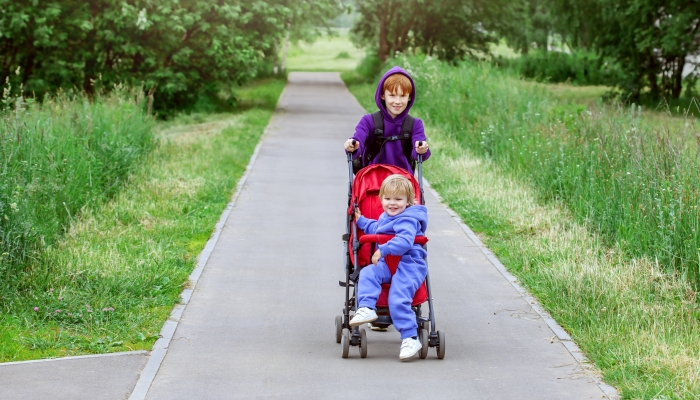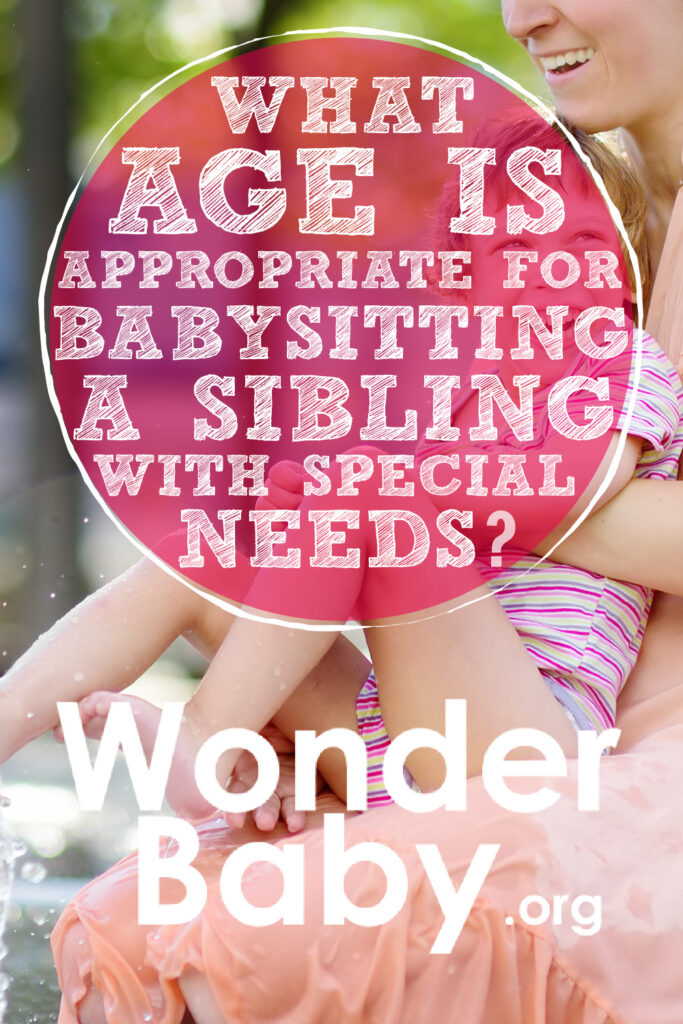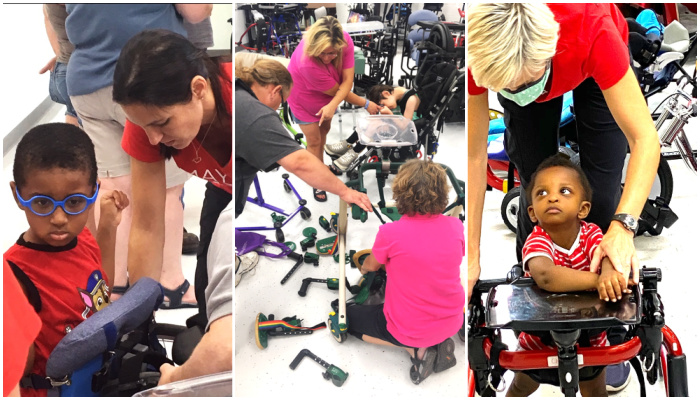What Age is Appropriate for Babysitting a Sibling with Special Needs?

- There are many factors to consider as you determine if your child can babysit their sibling(s) with complex care needs.
- Your child may show emotional or behavioral signs indicating they are unable or not ready to care independently for a sibling who needs extra care.
- If you choose to have your child babysit their sibling with special needs, make safety preparations for them before leaving home.
There’s no doubt that raising a child with special needs can be difficult and drain the energy of even the most resilient parent. Whether your child has physical, cognitive, emotional, or behavioral conditions that necessitate advanced care, a parent’s emotional and caregiving batteries can drain quickly, leaving you searching for some respite and a break.
Frequently, children with complex care needs are not the only children within a family system. Siblings are also often present and bear daily witness to the joys and challenges that are part of life of raising a child with special needs.
Many families struggle to find care for their children during the appointments and errands that are part of daily life. This is particularly true for parents of special needs children.
It may seem like an easy answer to childcare struggles to have your other children babysit their sibling with special needs while you attend to other tasks. But how do you know when they’re ready?
When Is the Right Time to Babysit a Special Needs Sibling?

The decision to have your child babysit their sibling (or siblings) with special needs is largely unique to each family. Some families may decide that their child is ready for this responsibility at a younger age, while others may wait to ask this of their child (if at all).
Regardless, there are some important factors to be considered when choosing the right age or time to start babysitting a special needs sibling:
Age
Chronological age is not the only factor to consider when determining babysitting readiness.
Many younger children are mature for their age and may be up to the task of caring for their older siblings with special needs.
Regardless, most childhood experts11. . Patient & Family Education Materials. Children’s Minnesota. 2024. https://www.childrensmn.org/educationmaterials/kids/article/11498/when-can-i-babysit agree that children can start to manage to babysit at or around ages 11–13.
Willingness
Experts from Michigan State University22. Lindquist, S.. Siblings babysitting siblings: Many factors to consider. MSU Extension. 2017. https://www.canr.msu.edu/news/siblings_babysitting_siblings_many_factors_to_consider#:~:text=Michigan%20has%20no%20law%20regarding,the%20best%20fit%20for%20them. report that parents should include the child who will potentially be babysitting their special needs sibling in caregiving conversations and have their wants and needs considered and discussed.
Siblings of children with special needs also deserve a healthy upbringing. Further, they may already suspect that they will be needed (or expected) to provide care for their siblings as their parents age and are unable to provide these services.
Siblings may need permission or extra attention to have as many “normal” childhood experiences as possible and not assume adult caregiving responsibilities33. Stein, M.. Parentification: The impact of children taking on parental roles in their family. College of Agricultural, Consumer & Environmental Sciences University of Illinois. 2023. https://aces.illinois.edu/news/parentification-impact-children-taking-parental-roles-their-family#:~:text=But%20sometimes%20the%20roles%20are,serious%20consequences%20for%20their%20children. too soon.
Maturity and Developmental Level

As many parents know, when it comes to children, we should expect the unexpected.
In addition to babysitting or caregiving activities, it’s also important to consider if your child is up to managing household or safety concerns while you’re out of the house.
Consider factors such as:
- Will they be able to respond appropriately if there’s a medical or behavioral emergency?
- Have they had experience managing these types of concerns in the past?
- What was their response? Knowing if your babysitter’s stress response tends towards fight, flight, or freeze44. LeWine, H. E.. Understanding the stress response. Harvard Health. 2024. https://www.health.harvard.edu/staying-healthy/understanding-the-stress-response may help guide you as you make a decision.
While children may indeed be mature for their age and circumstances, noted child psychologist Jean Piaget55. Kurt, S.. Jean Piaget: Biography, Theory and Cognitive Development. Education Library. 2022. https://educationlibrary.org/jean-piaget-biography-theory-and-cognitive-development suggests that children develop formal reasoning differently from adults and should not, therefore, be considered “little adults” who are capable of the same levels of higher thinking.
Legal Concerns
An equally important, yet less discussed factor, in determining child readiness to babysit is the potential legal consequences if something serious goes wrong while you’re away from home.
According to the Child Welfare Information Gateway from the State of Michigan66. . Leaving Your Child Home Alone. Child Welfare Information Gateway. 2007. https://www.michigan.gov/-/media/Project/Websites/mdhhs/Folder2/Folder100/Folder1/Folder200/homealone.pdf?rev=272ca6f449444ad984fbf13c91db16eb, a few states have laws in place that specify the minimum age at which a child can be left home alone. (Laws in your state may have changed since the publication date; please seek current legislature and recommendations from your state.)
The Child Welfare factsheet also reminds parents that “leaving a young child unsupervised may be considered neglect, especially if doing so places the child in danger.” This can also apply to inadequate supervision.
Warning Signs That It Is Not Yet the Right Time

As a parent of a special needs child, you may feel burned out or show signs that it’s time for a break to recharge your parenting batteries.
In these instances, it may seem like a natural idea to have your child watch their special needs sibling while you practice some much-needed self-care.
However, if your child shows these behaviors towards you or their sibling with special needs, it may not be time to leave them alone without an adult present:
- Defiance towards parents or other authority figures
- Overt physical or verbal hostility toward family members
- Difficulty following established house rules
- Struggling with executive functioning tasks like prioritization, impulse control, or decision-making skills
- Poor judgment skills
- Aggressive tendencies
- Violence (threatened or actual) towards self or family members
- Appearing overly anxious or panicked when left alone
Everyone in the family has the right to feel safe and cared for. It is your responsibility as the parent to ensure that your children’s physical and emotional environment is as safe as possible at any given moment.
Safety Considerations

If you choose to have other children in the family babysit their sibling(s) with special needs, it’s a good idea to make the following preparations for them while you’re away from home:
- Make sure your babysitter knows where your child’s emergency medical supplies are kept (and that they know how and when to use them).
- Review basic first aid skills.
- Clearly post phone numbers for parents and emergency services in a central location.
- Make sure your child knows their name, home address, and phone number.
- If your child has complex medical needs, it’s vital to ensure that your babysitter knows how to do (and is comfortable with performing) CPR or other life-saving maneuvers.
- If your child becomes overwhelmed or cannot safely provide care while you’re gone, it’s a good idea to have trusted adults on stand-by to serve as resources for your babysitter.
As a parent, you face many decisions when arranging care for your children with special needs. Each family must carefully evaluate whether or not they wish to ask their other children to babysit their sibling with special needs and make appropriate preparations for them.
References
- Patient & Family Education Materials. Children’s Minnesota. (2024, September 27). https://www.childrensmn.org/educationmaterials/kids/article/11498/when-can-i-babysit
- Lindquist, S. (2017, March 6). Siblings babysitting siblings: Many factors to consider. MSU Extension. https://www.canr.msu.edu/news/siblings_babysitting_siblings_many_factors_to_consider#:~:text=Michigan%20has%20no%20law%20regarding,the%20best%20fit%20for%20them.
- Stein, M. (2023, December 6). Parentification: The impact of children taking on parental roles in their family. College of Agricultural, Consumer & Environmental Sciences University of Illinois. https://aces.illinois.edu/news/parentification-impact-children-taking-parental-roles-their-family#:~:text=But%20sometimes%20the%20roles%20are,serious%20consequences%20for%20their%20children.
- LeWine, H. E. (2024, April 3). Understanding the stress response. Harvard Health. https://www.health.harvard.edu/staying-healthy/understanding-the-stress-response
- Kurt, S. (2022, November 17). Jean Piaget: Biography, Theory and Cognitive Development. Education Library. https://educationlibrary.org/jean-piaget-biography-theory-and-cognitive-development
- Leaving Your Child Home Alone. Child Welfare Information Gateway. (2007, July). https://www.michigan.gov/-/media/Project/Websites/mdhhs/Folder2/Folder100/Folder1/Folder200/homealone.pdf?rev=272ca6f449444ad984fbf13c91db16eb

The information WonderBaby provides is not intended to be, and does not constitute, medical or other health advice or diagnosis and should not be used as such. Always consult with a qualified medical professional about your specific circumstances.
Related Posts

Special Needs
5 Spring Cleaning Tips for Families of Children with Disabilities
Spring cleaning is an opportunity to create a more accessible, organized, and supportive space for your child with disabilities. Declutter, deep clean, and refresh!

Visual Impairment
The Gift of Understanding: How a Young Child Helps His Blind Father Navigate Life
When a parent is blind, it’s natural for people to wonder how their sighted child will adapt. Will they struggle to understand their parent’s needs? Will they feel burdened by...

Assistive Technology, Support
May We Help: Engineering Independence for People with Disabilities
May We Help is dedicated to designing and building custom solutions that help individuals of all ages achieve mobility, access, and independence, all at no cost.